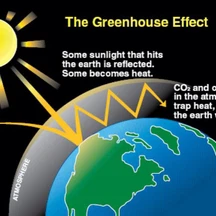Question & Answer
Question & Answer
Q: What are greenhouse gases?
The Answer
Last update 2022.06.09
<p style=";text-align:left;direction:ltr"><strong>Greenhouse gases: They</strong> are gases in the atmosphere that trap the heat that the Earth emits into space, such as the effect of greenhouses that allow sunlight to pass through but prevent heat from escaping from the Earth to the outside, and this is important for regulating the Earth’s heat and making it viable, but When its percentage increases, it causes global warming, which leads to a rise in the Earth's temperature.</p><p style=";text-align:left;direction:ltr"></p><p style=";text-align:left;direction:ltr"> The main types of greenhouse gases are:</p><ol style=";text-align:left;direction:ltr"><li style=";text-align:left;direction:ltr"> <strong>Water vapor:</strong> It is the most abundant greenhouse gas in the atmosphere, but its effect is interactive with climate change, as water vapor increases with the temperature of the Earth’s atmosphere, as well as the possibility of clouds and precipitation increasing, which makes these some of the most important feedback mechanisms for the greenhouse effect. thermal.</li><li style=";text-align:left;direction:ltr"> <strong>Carbon dioxide (CO2):</strong> Carbon dioxide is released through natural processes such as respiration and volcanic eruptions, and through human activities such as fossil fuel burning, deforestation, and changes in land use.</li><li style=";text-align:left;direction:ltr"> <strong>Methane (CH4):</strong> It is a hydrocarbon gas that is produced through natural sources and human activities, including the decomposition of waste in landfills, agriculture, especially rice cultivation, and also produced from the digestion processes in the bodies of ruminants and the management of manure resulting from the organic waste of domestic livestock, and methane is A much more active greenhouse gas than carbon dioxide, however, it is less abundant in the atmosphere.</li><li style=";text-align:left;direction:ltr"> <strong>Nitrous oxide (N2O):</strong> is a potent greenhouse gas produced by agricultural practices, particularly the use of commercial and organic fertilizers, fossil fuel combustion, nitric acid production, wastewater treatment and biomass burning.</li><li style=";text-align:left;direction:ltr"> <strong>Chlorofluorocarbons (CFCs):</strong> These are man-made compounds that are used in many fields, but now their production and release into the atmosphere are determined by international agreement for their ability to contribute to the destruction of the ozone layer, and they are also a powerful greenhouse gas.</li></ol><p style=";text-align:left;direction:ltr"></p><p style=";text-align:left;direction:ltr"></p>

Arabia Weather App
Download the app to receive weather notifications and more..
